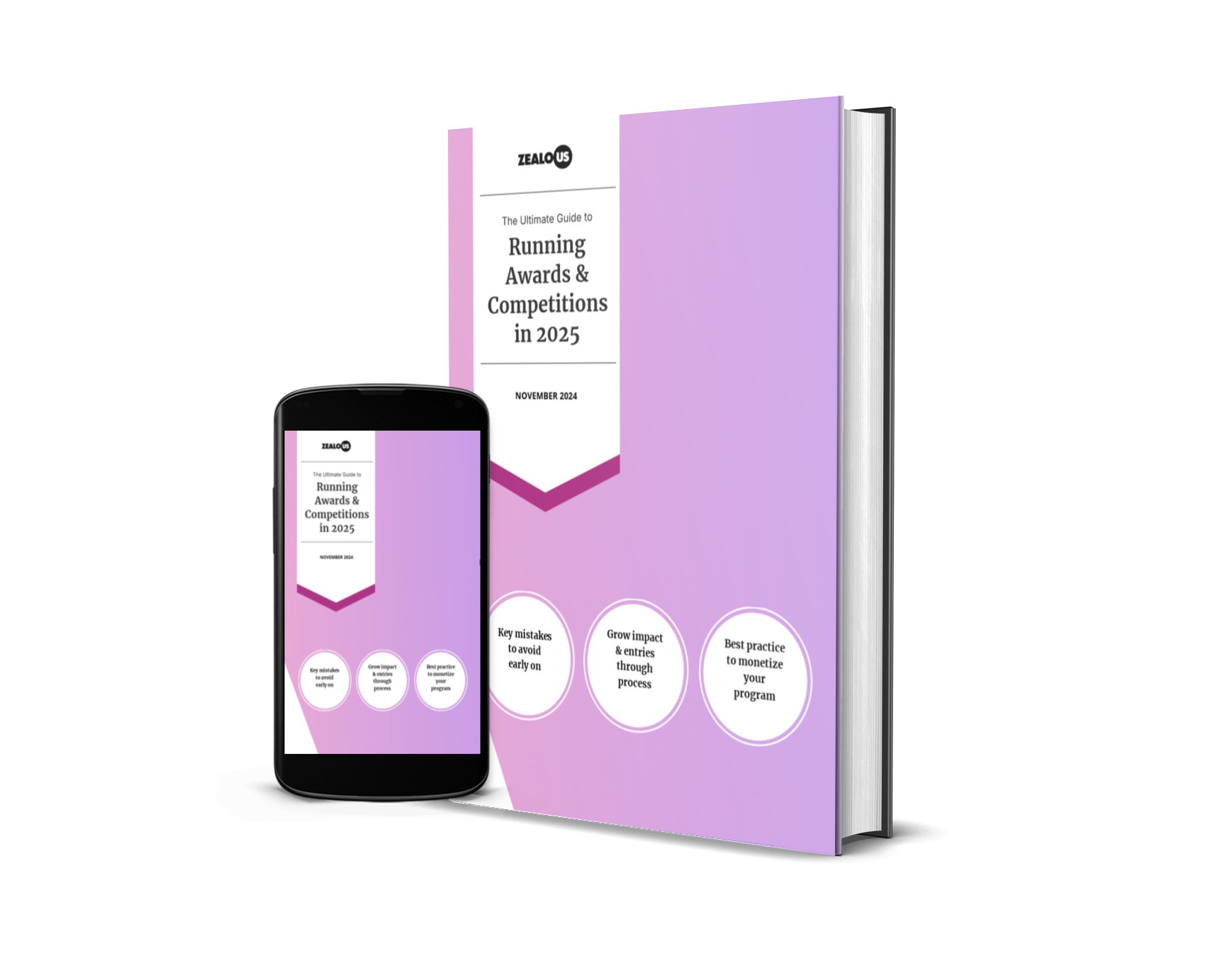Your awards program has outgrown your capacity to manage alone. This guide covers exactly what hiring an Awards Coordinator involves: complete job descriptions for freelance and part-time roles, realistic cost breakdowns (including hidden expenses), essential interview questions, and alternatives that might save you money. By the end, you’ll know whether hiring is right for your program and have everything needed to make the decision.
Why Awards Coordination Becomes Overwhelming
Most awards start small: a handful of applications, a few judges, a simple ceremony. Success brings complexity.
Last year’s 50 applications become this year’s 200+. You’re drowning in emails from confused applicants who can’t figure out your submission system. Those three local judges you started with? Now you’ve got 15 experts scattered across different time zones, all expecting personalized attention and wondering why the scoring deadline changed again.
The real killer? Your audience now expects professional-grade everything. They’ve seen the slick processes from major industry awards, and your homemade spreadsheet system suddenly looks… well, homemade.
There’s always that moment when you realize someone on your team is spending more time managing awards logistics than doing their actual job. Or when a key volunteer burns out right before your ceremony because “this is way more work than we thought.”
Sound familiar?
Your Hiring Options: Freelance vs Part-Time Staff
The type of hire you make affects everything from job requirements to success metrics. Here are your two main options:
Option 1
Freelance Awards Coordinator
An experienced freelancer who can take your awards program from planning through celebration while you focus on your organisation’s core work. They bring their own systems, templates, and expertise.
Project Type: Annual awards program coordination
Timeline: 9-10 months
Budget: ~£200-300/day variable based on location (estimated 40-60 days total)
Commitment: Flexible schedule with intensive periods during deadlines
Advantages:
- Tap into specialist expertise without long-term employment commitment
- Scalable support that matches your program’s intensity periods
- Fresh perspective from someone who’s managed multiple awards programs
- Clear project boundaries with defined deliverables and timeline
Disadvantages:
You’ll still need internal oversight and decision-making throughout. Knowledge transfer happens annually – you’re not building institutional memory. Peak periods may conflict with other client commitments, and project scope can expand if program complexity increases mid-year.
Option 2
Part-Time Staff Coordinator
Many organisations find that full-time awards coordination is overkill, but annual freelance projects don’t build the institutional knowledge they need. Part-time permanent roles offer the sweet spot: consistent expertise that grows with your program, without the full-time salary commitment.
Employment: Permanent part-time, 3 days/week
Salary: £18,000-22,000 pro rata based on location (£30k-37k full-time equivalent)
Benefits: Pension, holiday allowance, professional development budget
Advantages:
- Consistent expertise that develops deep understanding of your community and values
- Flexible arrangement that provides coverage during peak periods without year-round costs
- Career development opportunity that attracts quality candidates seeking work-life balance
- Institutional knowledge building that protects against single points of failure
Disadvantages:
Still requires management time and integration into your organisation. May need additional freelance support during absolute peak periods. Limited availability during their off days can create bottlenecks, and salary and benefits costs are ongoing even during quiet periods.
Which should you choose?
Choose Freelance When: You have internal project management capacity, your awards run annually with clear start/end dates, you want to test different coordinators, or budget constraints make full-time hiring impossible.
Choose Part-Time When: You run multiple programs requiring year-round coordination, building internal awards expertise is strategically important, you have budget for £40,000+ annual commitment, or your programs involve complex stakeholder relationships requiring continuity.
Free Download
Award Coordinator Hiring Pack
Includes
- Job description templates for freelancers and part time staff
- Key interview questions
- What to watch out for to select the best candidate
- Tips on reducing costs of hiring coordinators
The Real Cost of Hiring (Including What They Don’t Tell You)
Most people underestimate what hiring actually costs. You might see “£200-300 per day” for a freelancer and think that sounds reasonable, but there’s a whole iceberg of hidden expenses lurking beneath that daily rate.
Freelance coordinator: What You’ll Actually Spend
Direct Project Costs:
- Daily rate: £200-300 (London rates)
- Estimated project days: 40-60 over 10 months
- Core project cost: £8,000-18,000
But here’s where it gets expensive.
Someone on your team needs to manage this freelancer, and that takes way more time than you’d expect. You’ll spend hours briefing them on your organization’s quirks, reviewing their work, answering questions about stakeholders, and generally making sure they don’t accidentally offend your biggest sponsor.
Hidden costs that add up:
- Project management time: 3-5 hours weekly during active periods
- Internal staff time at £50/hour: £2,000-4,000 additional
- Annual knowledge transfer: 8-12 hours getting new freelancers up to speed
- Project scope expansion (budget 15-25% contingency)
Total realistic freelance investment: £12,000-28,000 + significant internal management time
Part-time staff: The Full Picture
Part-time employment feels more predictable, but comes with its own financial surprises. Beyond the obvious salary costs, you’ve got National Insurance contributions, pension requirements, equipment setup, and all the ongoing HR responsibilities that come with having employees.
Annual employment cost: £20,920-25,480 (including salary, NI, pension, equipment)
The hidden costs are different but equally real:
- Recruitment: 15-20 hours of your time across job posting, CV review, interviews, and reference checks
- Ongoing management: weekly check-ins, performance reviews, holiday coverage planning
- Costs for resources (computers, licences to software…)
- The general complexity of having employees rather than contractors
Total annual investment: £22,000-27,000 + ongoing management responsibility
Other risk factors to consider
Staff Turnover: Awards coordination has very high turnover. If your coordinator leaves mid-program, replacement costs include emergency recruitment fees, knowledge transfer gaps, potential program delays, and relationship disruption with applicants and judges.
Skills Gaps: Many coordinators excel at logistics but struggle with technical troubleshooting, data analysis and reporting, digital marketing, or financial reporting and budget management.
Red flags to avoid when hiring
Watch out for these warning signs that pop up repeatedly in coordinator applications:
Event planner mindset – They focus on catering and decorations while glossing over application management. Awards aren’t just parties.
Promises perfection – Anyone guaranteeing “zero technical issues” hasn’t run awards before. You want someone who plans for problems.
Overly casual communication – If their application reads like a text message, imagine how they’ll handle high-profile judges.
Can’t simplify complex processes – They’ll need to explain things to confused applicants and busy stakeholders. If they can’t make things clear in interviews, they’ll struggle everywhere else.
Shows no curiosity about your specific challenges – Good coordinators ask questions about your judging process and previous problems. Generic approaches rarely work.
Before You Hire: Consider the Alternative
Given the complexity and costs involved in hiring, many organisations are discovering that dedicated awards management platforms offer compelling advantages – and might eliminate the need for hiring altogether.
The Numbers Game
A comprehensive awards management platform typically costs £2,000-£8,000 annually – significantly less than employing a coordinator while offering:
- Built-in expertise from years of awards management best practices
- Scalability to handle growing application volumes without additional staff costs
- Technical reliability with professional hosting, security, and backup systems
- Automated processes that reduce manual work and human error risks
- Integrated tools combining application management, judging systems, and communication
What to Automate vs What Stays Human
Perfect for Automation:
- Application processing, eligibility checking, and technical support
- Judge briefing, score collection, and progress tracking
- Applicant communications, status updates, and deadline reminders
- Winner notifications, certificate generation, and basic reporting
Take two minutes to grow entries & reduce stress
Receive weekly tips to grow your impact regardless of what tools you use.
Tasks that benefit from human touch:
- Strategic program development and stakeholder relationship building
- Complex judge deliberations and conflict resolution
- High-level sponsor management and partnership development
- Crisis management and sensitive communication situations
The smart starting point
Many successful awards programs start with platforms to establish efficient systems, then add human expertise only where needed. This approach reduces coordination workload, proves program viability before major hiring commitments, and builds efficient foundations for future growth.
Starting with platforms first means any eventual hiring will be more targeted and cost-effective because you’ll know exactly which tasks actually require human expertise.
Making Your Decision
Start with platforms, then add people: Most awards management platforms offer free trials or demos. Test one first to see what problems it solves and what tasks remain manual. If a platform handles 80% of your coordination headaches, you might not need to hire at all.
If you do need human help: You’ll now know exactly which tasks to hire for, making your job description more targeted and your hiring more successful.
Choose your path:
- If platforms solve most needs: Start there and add selective human help later
- If you definitely need a person: Begin with freelance to test requirements before committing to staff
- If managing multiple complex programs: Budget for part-time staff and plan for a 3-6 month hiring timeline
Remember: it’s easier to start with freelance and convert to staff than the reverse. And automation first means any eventual hiring will be more targeted and cost-effective.
The goal isn’t just managing your awards program – it’s creating sustainable systems that let you focus energy on celebrating excellence and building community around your mission.
Tired of managing awards with spreadsheets & clunky tools?
Discover how our sleek awards management platform streamlines every aspect of your program from first submission to final celebration .
Let us know you want us to write more content like this with a love!
Share

Guy Armitage is the founder of Zealous and author of “Everyone is Creative“. He is on a mission to amplify the world’s creative potential.









